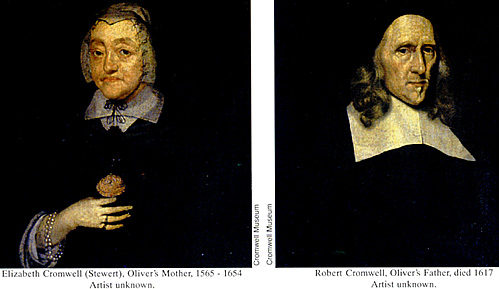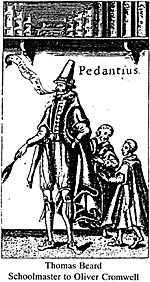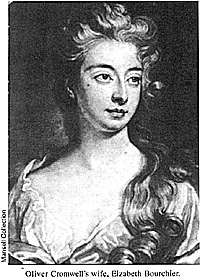 His father was Robert Cromwell, the second son of Sir Henry Cromwell of Hinchinbrooke, the 'Golden Knight', a zealous supporter of witch-hunting who attributed his wife's death to witchcraft. Sir Henry's father, Richard bequeathed him the estates he had inherited from his uncle Thomas a chief minister of Henry VIII in the 1530's. The lands had formerly been the property of the Catholic church that had been given out by Henry VIII when he dissolved the monasteries. These passed to Sir Oliver in 1604. Sir Oliver's lifestyle here was an opulent one and he once entertained Queen Elizabeth and King James, the father of Charles I, in 1603 en-route to his ascension. His ancestry reached back to Henry VII and the Welsh royalty through the Williams and he was to incorporate this into his arms and seals on becoming Protector. Royalist propaganda and slander would later make good use of his lineage and their deeds, comparing his treatment of Catholicism to his ancestor Thomas. It was also rumoured that Henry, by marriage to his second wife Anne Hooftman, introduced Jewish blood into the family which which some have later argued may account for his kind treatment of them as Protector.
His father was Robert Cromwell, the second son of Sir Henry Cromwell of Hinchinbrooke, the 'Golden Knight', a zealous supporter of witch-hunting who attributed his wife's death to witchcraft. Sir Henry's father, Richard bequeathed him the estates he had inherited from his uncle Thomas a chief minister of Henry VIII in the 1530's. The lands had formerly been the property of the Catholic church that had been given out by Henry VIII when he dissolved the monasteries. These passed to Sir Oliver in 1604. Sir Oliver's lifestyle here was an opulent one and he once entertained Queen Elizabeth and King James, the father of Charles I, in 1603 en-route to his ascension. His ancestry reached back to Henry VII and the Welsh royalty through the Williams and he was to incorporate this into his arms and seals on becoming Protector. Royalist propaganda and slander would later make good use of his lineage and their deeds, comparing his treatment of Catholicism to his ancestor Thomas. It was also rumoured that Henry, by marriage to his second wife Anne Hooftman, introduced Jewish blood into the family which which some have later argued may account for his kind treatment of them as Protector.
Oliver Cromwell's 'mother was Elizabeth Alleged to be the birthplace of Steward, whose family shared the Cromwell's fortune in dissoluted monasterial lands around Ely. Formerly the wife of William Lynne who had died in 1589, bequeathing her it is alleged a 'brew-house'. She was close to Oliver Cromwell throughout most of his life and a foreign Ambassador remarked on her as, "a women of ripe wisdom and great prudence." With Oliver as her only surviving son amongst 6 daughters it is likely she spoilt him which could account in part for his temprement as an adult.
As well as being elected MP for Huntingdon in 1593 Robert Cromwell was a Justice of the Peace, became one of Huntingdon's two bailiffs in 1609 and along with his brother Sir Oliver Cromwell was active in fen drainage projects. All of which provided a yearly income of £ 300 a relatively low amount for gentry but enough to live in the grand house built where the Augustinian Friary of Huntingdon had once stood. Though the Cromwell family as a whole was wealthy and influential very little of it found it's way to Robert Cromwell.
 Oliver Cromwell was schooled at Huntingdon Grammer School by its master, Dr. Thomas Beard. Beard, a graduate of Cambridge and prominent Puritan advocate, was appointed as a minister in Huntingdon in 1604. Three works by Beard bequeathed to the Church of England spoke out fiercely against sin and the 'Antichrist which is the Pope of Rome'. His most read was 'The Theatre of God's Judgements', which illustrated how sinners were punished throughout history whereas the faithful were rewarded to encourage those that sinned (especially Prince's) to repent or face God's wrath. His examples were 'those that rebell against their superiors' or 'such as have murthered (murdered) their rulers or Princes', Beard condemned monarchs who abused their position by excessive taxes, going above the law, making war on their subjects or being generally cruel and oppressive. The book listed numerous examples from the Bible and real life of those that receive God's wrath and those that receive "the protection of holy Angels over such as feare God". Beard's later work, "Antichrist The Pope of Rome," echoed the fear of popery at the time. In this work Beard took great pains to illustrate what he considered a decrepite Age of the World' and warned people of the wicked ness of the antichrist pope and encouraged them to 'be more ravished enamoured with Christ. and long for his coming and the full revelation of his glory' .
Oliver Cromwell was schooled at Huntingdon Grammer School by its master, Dr. Thomas Beard. Beard, a graduate of Cambridge and prominent Puritan advocate, was appointed as a minister in Huntingdon in 1604. Three works by Beard bequeathed to the Church of England spoke out fiercely against sin and the 'Antichrist which is the Pope of Rome'. His most read was 'The Theatre of God's Judgements', which illustrated how sinners were punished throughout history whereas the faithful were rewarded to encourage those that sinned (especially Prince's) to repent or face God's wrath. His examples were 'those that rebell against their superiors' or 'such as have murthered (murdered) their rulers or Princes', Beard condemned monarchs who abused their position by excessive taxes, going above the law, making war on their subjects or being generally cruel and oppressive. The book listed numerous examples from the Bible and real life of those that receive God's wrath and those that receive "the protection of holy Angels over such as feare God". Beard's later work, "Antichrist The Pope of Rome," echoed the fear of popery at the time. In this work Beard took great pains to illustrate what he considered a decrepite Age of the World' and warned people of the wicked ness of the antichrist pope and encouraged them to 'be more ravished enamoured with Christ. and long for his coming and the full revelation of his glory' .
On 23rd April 1616 he entered Sidney Sussex College Cambridge, 'a hotbed of Puritanism' which is covered in more detail in the article 'Cromwell and Cambridge.'
As well as the strong religious content of his education the young Cromwell also received tuition in Latin, Mathematics and of particular interest to Cromwell, History. At 5 foot 10 inches he was taller than his fellow students and 'well compact and strong'. He was a keen sportsman as well enjoying 'horse and field exercise, football, cudgels, and other manly sports'. Some sources claim he preferred physical activities and was, 'easily satiated with study, taking more delight in horse and field exercise'. He was well known in his later years for hunting and hawking and his enthusiasm for horses was evident in the care he gave to the cavalry during the war.
With the death of his father in June 1617, Oliver Cromwell abandoned his education at Cambridge and returned to Huntingdon. The Cromwell's estates very nearly became the property of the Crown due to Oliver, (as the only legitimate heir) being under-age. His time spent in Huntingdon on his return was not particularly productive according to Carrington in the 'Perfect Politician.'
"He returned home again. There for some time he spent his life not altogether free from the wildnesses and follies incident to youthful age, to the wasting of some part of that small estate his Father had left him."
Heath's Flagellum is more 'colourful' on the subject:
"He fell to his old trade and frequcated his old haunts. consumed his money in tipling, in his drink he used to be so quarrelsome as few (unless as mad as himself) durst keep him company, his chief weapon in which he delighted....was a Quarter-staff, in which he was so skilful that seldom did any overmatch him".
There is no record of his activities for the next 3 years, though some sources claim he briefly fought in the Thirty Years War, met Menasseh ben Israel the future champion for Jewish rights in Amsterdam or made merry in Paris, but it is more likely he busied himself with running his fathers estate and caring for his mother for a time before going to London to study law as his father and grandfather had done.
In Flagellum, Heath voices his opinion of this part of Cromwell's life:
"Weary of the Muses and that strict course of life he returned home It was concluded to scud him to one of the Inns of Court. under pretence of his studying the Laws Lincoln's Inne was the place pitch'd upon-where he for a very little while he continued he had a kind of antipathy to his Company and his Converse there and it is some kind of good luck for that honourable Society that he hath left so small and so innocent a memorial of his Membership therein."
As he may not have even been there at all it would account for Heath's inability to find any reference to him. It is more likely, if he did actually study Law that it was at another Inn, Gray's, as a huge number of people that would be strong allies in Parliament and the wars were students here at the time: Oliver St John, John Claypole (whose son married Cromwell's daughter), the major-generals Jephson and Lambert and 22 of the 'regicides' had links with Gray's to name some of the many.
The most important link to him being at Gray's is that 7 members of the Bourchier family were studying here, and it was at this time he met and married his wife Elizabeth Bourchier on 22nd August 1620 at St. Giles Church, Cripplegate, at the age of 21. She was the daughter of Sir James Bourchier a wealthy, knighted fur dealer and leather dresser with a country seat in Essex. Cromwell's detractors did not spare Elizabeth from their mockery either giving her the name 'Joan', a title reserved for common peasant girls. Both Fairfax and Waller accused Cromwell of being under her thumb and she has been portrayed as both a quick witted and spirited woman and also as dour and meek.
 Cromwell's relationship with his wife is summed up in a Restorationist document entitled, 'Dreadful News in Hell', when, upon being told by his still living wife, 'Joan', that she fears she might be sent to the Tower, 'Old Noll', (Cromwell) , as a ghost replies, "Why? You were never accessory to any of my horrid villainits, were ye?
Cromwell's relationship with his wife is summed up in a Restorationist document entitled, 'Dreadful News in Hell', when, upon being told by his still living wife, 'Joan', that she fears she might be sent to the Tower, 'Old Noll', (Cromwell) , as a ghost replies, "Why? You were never accessory to any of my horrid villainits, were ye?
They returned to Huntingdon to farm and raise a family. Over the next 17 or so years Elizabeth bore him nine children of whom the majority survived childhood. Most notable was his son Richard, who briefly succeeded his father as Lord Protector in 1658.
Over time Cromwell became active in local politics becoming elected as one of the two MPs for Huntingdon in 1628, (the other his rival Edward Montague), his uncles influence no doubt being of some small assistance. One of his first controversial moves in his political career was as a minor supporter to the 'Petition of Right', which made illegal Charles I raising taxes or imprisoning arbitrarily without consulting Parliament Cromwell gave his first speech before Parliament, it's content in part asking for free preaching of Puritan doctrine. Becoming more prominent not long after in a matter concerning his old schoolmaster and family minister Thomas Beard. Beard ha been censured by a former Bishop of Lincoln or Dr Richard Neile, the Bishop of Winchester, sources differ, for ignoring instructions not to preach against a 'popish' sermon by a Dr. Alabaster. The Bishop was censured instead by Parliament an Beard was summoned to the House of Commons to be heard Unfortunately other events transpired and Beard never got to state his case before the House of Commons as on 2nd Marc 1629 Charles I dissolved Parliament and began 11 years of total monarchy. The Beard matter was part of a larger effort by Pym and Eliot to reform the King's religious policy but he shared hi father's view of 'No Bishop, no King' and dissolved Parliament due to 'the undutiful and seditious carriage in the lower house'. The scenes that occurred in the last moments before the King mad his proclamation involved Cromwell and others refused to adjourn until the King had satisfied their demands which were read out by Eliot while Holles and Valentine held the Speaker of the House by force.
More Birth of Cromwell
Back to English Civil War Times No. 56 Table of Contents
Back to English Civil War Times List of Issues
Back to Master Magazine List
© Copyright 1999 by Partizan Press
This article appears in MagWeb (Magazine Web) on the Internet World Wide Web.
Other military history articles and gaming articles are available at http://www.magweb.com